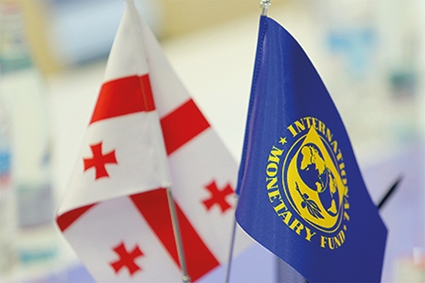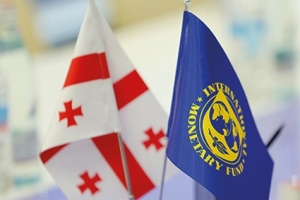IMF Experts See Positive Trends on Regular Visit to Georgia
On Monday, a team from the International Monetary Fund (IMF) concluded a seven-day visit to Georgia. The team, led by Deputy Division Chief Mercedes Vera-Martin, evaluated Georgia’s economic conditions in regards to the IMF-supported programs and to update its periodic forecast. The team discussed recent economic and financial developments and Georgia’s progress toward structural reforms.
The team came away with an optimistic projection, praising the National Bank’s monetary policy and the continued implementation of structural reforms. Subsequently, they revised the GDP growth projection .7 percentage points upwards to 5.5% for the year.
Vera-Martin published an end-of-mission statement summarizing the visit’s findings on Georgia’s economy in the first half of the year. She wrote:
“Growth reached 5.7%, supported by robust external demand, remittances, and credit. Preliminary estimates suggest a better-than-expected budget performance through June. Inflation, which stood at 2.8% in July, has been below the end-year target (3%). With inflation expected to remain subdued, the National Bank of Georgia (NBG) started to normalize monetary policy by decreasing its policy rate by 25 basis points. Meanwhile, deposit and loan dollarization continue to decline.
Considering the stronger economic activity, the GDP growth projection for 2018 was revised upwards from 4.8% to 5.5%. The strong economic activity and weaker terms of trade are expected to widen the current account deficit. Increased downside risks to the outlook, driven by regional developments and global trade tensions, call for building up reserves and continued exchange rate flexibility, which has served the country well; and prudent macroeconomic policies to bolster resilience to external shocks.
The team welcomed the progress made by the authorities in implementing structural reforms and ongoing initiatives, and stressed the need for continued efforts to support higher and more inclusive growth. The authorities have established an independent pension agency and adopted regulations to implement the new public private partnership law. They are also making progress toward modernizing the insolvency law and regulations to promote responsible lending. The current economic environment offers an opportunity to advance structural reforms to increase economic resilience, boost private-sector led growth, diversify the economy, and improve the living standards of Georgian citizens.”
The last IMF visit took place in February, 2018. The subsequent report said that “Economic developments in 2017 were positive. Growth reached 4.8%, driven by consumption and external demand. Rapid growth in exports, tourism, and remittances supported economic activity and narrowed the current account deficit to 7% of GDP through 2017Q3...Preliminary estimates show a better-than-expected fiscal performance in 2017...Going forward, containing current spending and improving revenue collection remain critical for increasing public investment to address infrastructure bottlenecks...The IMF mission discussed with the Georgian authorities progress towards implementing structural reforms to support higher, sustainable, and more inclusive growth.”
IMF staff will visit Georgia next in October 2018.
After the visit, Georgian Finance Minister Ivane Machavariani declared the evaluation a success. He called the revised GDP growth projection “a big achievement amid the foreign economic situation in our neighboring countries,” and noted that “The IMF estimates very highly the ongoing and planned reforms that we have presented to them.”
Machavariani continued, “the fact that we have a floating exchange rate makes the Georgian economy quite sustainable, and we have overcome challenges. The periodic currency fluctuations on the market should not give us any reason for panic. This is a demonstration that we have a solid and healthy economy. Inflation is quite low, less than it was forecast...there is no reason to raise the alarm.”
By Samantha Guthrie











